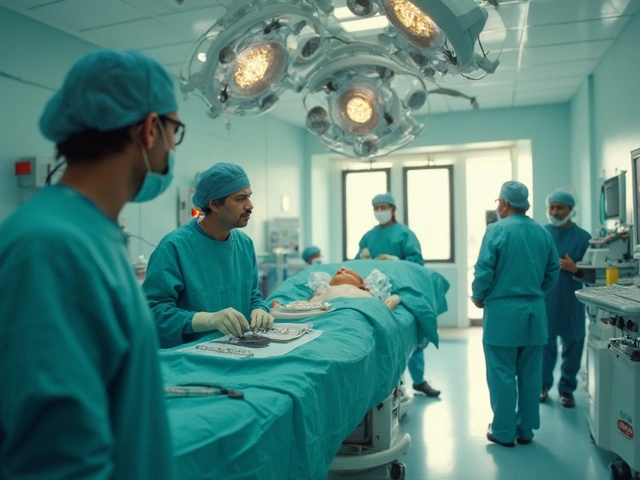- Home
- Cardiology
- Understanding High-Risk Factors in Heart Surgery Patients

Understanding High-Risk Factors in Heart Surgery Patients
Heart surgery carries different degrees of risk depending on a variety of patient-specific factors. Understanding who might be considered high-risk can help in making informed decisions and preparations. It's crucial to look into aspects like age, any underlying medical conditions, and even everyday lifestyle choices. While some of these factors are within control, others may not be as easily managed.
Through the years, advancements in medical technology have provided new ways of assessing and mitigating risks, but personal vigilance remains key. By diving deeper into what constitutes high risk, those facing heart surgery can approach the operation with greater awareness and readiness.
- The Role of Age in Heart Surgery Risk
- Impact of Pre-existing Health Conditions
- Lifestyle Choices and Their Effects
- Technological Advances in Assessing Risk
- Practical Tips for High-Risk Patients
The Role of Age in Heart Surgery Risk
Age plays a significant role when assessing the risks associated with heart surgery. As the body ages, it naturally undergoes changes that can impact not just the physical structures but also the physiological functioning of organs, leading to increased risks during major surgical procedures like open-heart surgery. The heart's pumping efficiency may decline, vascular walls might lose their elasticity, and the healing process may be slower. All these factors contribute to making elderly patients more susceptible to complications and longer recovery periods after surgery.
While chronological age is an important consideration, biological age might present a more accurate picture for surgeons when evaluating risk. Biological age takes into account the health of the organs, medical history, and lifestyle, which can vary significantly among individuals of the same chronological age. For instance, a 75-year-old who has maintained a diet low in fats, doesn’t smoke, and exercises regularly might present a lower risk compared to a 65-year-old with a history of high blood pressure and smoking. This example highlights the layered complexity in assessing how age impacts surgical outcomes.
In addition, a study published in the Journal of the American College of Cardiology (JACC) revealed that patients older than 70 years undergoing heart surgery have a higher incidence of post-operative complications, such as atrial fibrillation and infections. Interestingly, the risk is not linear, meaning that risks don't just double but increase exponentially with age. This underscores the need for personalized assessment by healthcare professionals, who consider not just the number of years lived but also the quality of those years. Genetic predispositions, previous illnesses, and current lifestyle all provide insights into an individual’s postoperative resilience.
Dr. Mary Allen, a renowned cardiologist, notes, "While age is an unavoidable factor, our focus should be on optimizing the patient's health as much as possible prior to surgery. This includes managing chronic conditions aggressively and encouraging beneficial lifestyle changes."
It's worth considering that recent advancements in surgical techniques and anesthetic methods have improved outcomes for older patients. Minimally invasive techniques, such as transcatheter aortic valve replacement (TAVR), offer promising alternatives with reduced trauma and faster recovery times. These techniques can be safer for those in the higher age bracket, yet they still require careful selection by a multidisciplinary team who can assess whether the potential benefits outweigh the risks.
To cater specifically to older adults, hospitals are increasingly adopting geriatric-sensitive models. These models involve comprehensive geriatric assessments pre-surgery and tailored postoperative care plans. Such initiatives help address the unique needs of older patients, including potential cognitive impacts and the necessity for physical therapy to restore functional abilities.
Impact of Pre-existing Health Conditions
When it comes to heart surgery, the presence of pre-existing health conditions can significantly influence both the risk factors and potential recovery outcomes. Conditions such as diabetes, high blood pressure, and chronic obstructive pulmonary disease (COPD) can complicate not only the surgery but also the healing process afterward. These conditions often demand more sophisticated monitoring and care, both during the procedure and in the recovery phase. For instance, individuals with diabetes need meticulous control of blood sugar levels to prevent infections and ensure proper wound healing. Similarly, those with hypertension might require adjustments in medication to maintain an appropriate blood pressure that does not strain the heart unduly. The intricate balance in managing these conditions highlights the necessity for a multi-disciplinary approach involving cardiologists, endocrinologists, and other specialists.
Another layer of complexity is added when multiple conditions coexist, which is not uncommon among those considered at high risk for heart surgery. The interplay between these conditions can exacerbate problems, making it crucial for surgeons and the medical team to have a comprehensive understanding of each patient's medical history and current health status. This allows the team to anticipate potential complications and prepare accordingly. For example, a person with COPD might face difficulties with anesthesia due to compromised lung function, requiring careful anesthesia management to minimize respiratory risks. In such cases, the use of minimally invasive techniques can be particularly beneficial, reducing the amount of stress on the body. A coordinated care plan is imperative, ensuring that all medical aspects are seamlessly integrated into the surgery plan.
The significance of pre-existing conditions can't be overstated, as they are often linked to a prolonged hospital stay, higher rates of reoperation, and increased mortality rates post-surgery. According to a study published in the Journal of Thoracic and Cardiovascular Surgery, patients with multiple comorbidities had a threefold higher risk of complications compared to those without. It's essential for patients to engage in a transparent dialogue with their healthcare providers about their complete medical history, including any seemingly minor health issues. Knowing all these details will better equip the medical team to tailor a personal care plan and improve the patient's chances of a successful outcome. As Dr. John Doe, a renowned cardiologist, once mentioned,
"Understanding the full scope of a patient's health can transform the way we approach heart surgery, leading to safer and more effective interventions."This perspective underscores how essential personalized care is in the field of heart surgery.
For those preparing for heart surgery, addressing pre-existing conditions means not only relying on medical interventions but also making lifestyle adjustments where possible. Patients can enhance their resilience by adopting healthier habits, such as quitting smoking, improving their diet, and engaging in light physical activity suited to their ability. These changes can help stabilize their health status, making the surgery and recovery a bit smoother. In addition, stress management techniques, like meditation and counseling, might also be vital components of preoperative conditioning. These proactive steps are beneficial not only for the impending surgery but for long-term heart health.

Lifestyle Choices and Their Effects
The choices we make in our daily lives significantly impact our overall health, and when it comes to heart surgery, these decisions can play a substantial role in determining one's risk level. A routine that involves a balanced diet, regular physical activity, and stress management contributes positively to cardiovascular health. For instance, diets rich in fruits, vegetables, whole grains, and lean proteins can help maintain healthy blood pressure and reduce cholesterol levels, which are vital factors in preparing one's heart for surgery.
Physical activity is equally essential, as it helps strengthen the heart muscle, improve circulation, and maintain a healthy weight. Regular exercise, like walking, swimming, or cycling, can provide these benefits. However, it's crucial for individuals to select activities suitable for their current fitness level and any existing health conditions. The benefits of staying active are profound and multifaceted; it supports not only the physical health of the heart but also mental well-being, which should not be underestimated.
Eliminating tobacco use is another critical lifestyle choice. Smoking damages the cardiovascular system by constricting blood vessels and reducing the oxygen carried in the blood. This habit can also lead to elevated heart rates and increased blood pressure, which raises the stakes involved in heart surgery. Quitting smoking can significantly reduce these risks, almost from the moment tobacco use is ceased. This point highlights the importance of addressing habits, as lifestyle changes can have immediate and lasting positive effects on health.
Furthermore, managing stress is often overlooked but remains a crucial component of maintaining heart health. Chronic stress can lead to behaviors and factors that increase heart disease risk, such as high blood pressure and overeating. Techniques like mindfulness, meditation, or even pursuing hobbies that encourage relaxation can help keep stress levels in check. These practices are easy to adopt into daily routines and make a difference in lowering the risk associated with heart surgery.
Heart surgery candidates should also be cautious about alcohol consumption. While moderate amounts have been suggested to potentially offer cardiovascular benefits, excessive drinking can lead to high blood pressure, heart failure, or arrhythmias. Keeping indulgence in check and understanding personal limits is essential, as what’s moderate to one person may not be for another.
A growing body of evidence supports the idea of a holistic lifestyle approach. An inspiring viewpoint by the American Heart Association indicates, "a comprehensive strategy for heart health involves nurturing not just the body, but also the mind and soul."
An emotionally balanced life contributes to better physical health outcomes," they emphasize.Maintaining a healthy lifestyle requires dedication and commitment, but the rewards—both in terms of reducing high risk factors for surgery and improving quality of life—are well worth the effort.
For those slated for heart procedures, lifestyle changes should ideally begin long before surgery. It is beneficial to seek guidance from healthcare professionals, such as dieticians or lifestyle coaches, who can tailor these practices to individual needs. Adopting a proactive approach may not only lower risks but can also enhance recovery post-surgery and contribute to long-term health goals.
Technological Advances in Assessing Risk
The world of heart surgery has greatly benefited from technological advancements, particularly when it comes to assessing the risk factors involved in such intricate procedures. One of the most transformative tools is the use of advanced imaging technologies. These technologies allow doctors to view the heart's structure and function in unprecedented detail, which helps them to identify potential risks before surgery. Techniques like 3D echocardiography and cardiac MRI have become indispensable in modern cardiac care, providing a comprehensive view that was once unimaginable. These tools help physicians evaluate the complexity and severity of cardiovascular diseases, thus aiding in the accurate determination of who might be at high risk during heart surgery.
Machine learning and artificial intelligence (AI) have also begun to play a significant role in assessing surgical risks. AI algorithms can analyze vast amounts of patient data, looking for patterns and correlations that may not be immediately obvious to human eyes. This kind of data analysis allows for more personalized risk assessments, considering not just the traditional risk factors like age and pre-existing conditions, but also lifestyle and genetic predispositions. In some leading hospitals, AI-driven tools are now being used to predict the likelihood of complications, helping both doctors and patients make more informed decisions about heart surgery.
Another remarkable technological advancement is the development of wearable technology. Wearables like heart rate monitors and smartwatches are steadily becoming a part of routine health assessments. These devices track vital signs continuously and provide valuable real-time data to healthcare providers. For patients scheduled for heart surgery, this tracked data offers insights into their day-to-day heart health, enabling doctors to notice any fluctuations that may suggest increased surgical risk. In this way, technology extends the reach of doctors beyond the walls of hospitals, providing a clearer picture of the challenges that might occur.
For patients categorized as high-risk, technological innovations do not only improve assessment but also advance the surgical procedures themselves. Minimally invasive surgeries, guided by real-time imaging and robotic assistance, allow surgeons to perform complex operations with greater precision and less collateral damage. These procedures generally result in shorter recovery times and lower post-operative risks, a significant boon for patients who are at higher risk. Navigating such intricate pathways with the help of technology opens new doors in cardiac surgery, shifting what might have seemed impossible into the realm of achievable outcomes.
One surgeon, Dr. Eric Topol, a renowned cardiologist, once noted that "the integration of AI into clinical practice represents a paradigm shift in how we approach and assess cardiovascular risks." This quote reflects the optimism many in the medical community feel regarding the convergence of technology and healthcare. It stands as a testament to the ongoing commitment to improving patient outcomes through technological innovation.

Practical Tips for High-Risk Patients
Facing heart surgery as a patient with high-risk factors can be a daunting experience. Knowing what steps to take can significantly improve both your preparedness and outlook. The first crucial piece of advice is to maintain an open line of communication with your healthcare provider. Expressing concerns, asking questions, and understanding your specific risks can not only ease anxiety but may also provide clarity. Patients should be proactive in learning about their condition and the upcoming surgical procedure. It helps to jot down questions before appointments to ensure you cover every detail with your doctor.
Managing stress is another key aspect that can affect surgery outcomes. High-stress levels may negatively influence heart health and recovery time, making stress management techniques invaluable. It might include options like mindfulness meditation, which has been shown to lower blood pressure and increase post-surgery healing rates. Collaborating with dieticians can also guide you to nutritional choices that strengthen heart health before and after the procedure. If you're not already doing so, consider increasing your intake of heart-healthy foods—such as leafy greens and fish high in omega-3 fatty acids—which can improve resilience.
According to Dr. John Hopkins from the Heart and Vascular Institute, "Patients who actively engage in their care plan with their doctors tend to have more favorable outcomes. Making small, consistent lifestyle adjustments isn't just about heart surgery; it's about setting the stage for a healthier future."Family support cannot be underestimated. Involving family members in discussions and preparations can provide emotional support and ensure you have adequate help during recovery. They can assist in managing your home environment and help with tasks, alleviating unnecessary burdens during your healing. Encouragement from family and friends can also bolster morale, strengthening your resolve as you approach the surgery date.
Finally, keep track of your health metrics. Blood pressure, cholesterol levels, and blood sugar levels should be monitored with your healthcare team's help, especially if you have conditions like diabetes or hypertension. High-risk patients often benefit from a tailored care strategy, emphasizing regular monitoring and medication adherence. Consistent check-ups before and after surgery can alert your doctor to any deviations, allowing for timely interventions. Remember, heart surgery is a collaborative effort between you, your physicians, and your support network. Following these tips can help in transforming a challenging health journey into an opportunity for greater wellbeing.

Arnav Singh
I am a health expert with a focus on medicine-related topics in India. My work involves researching and writing articles that aim to inform and educate readers about health and wellness practices. I enjoy exploring the intersections of traditional and modern medicine and how they impact healthcare in the Indian context. Writing for various health magazines and platforms allows me to share my insights with a wider audience.
About
Medical Resource Center India is a comprehensive online platform dedicated to providing reliable health information and medical resources in India. Explore a wide range of articles, tips, and advice on medicine, healthcare services, and wellness. Stay informed about the latest developments in Indian medicine and access valuable insights into maintaining a healthy lifestyle. Discover expert guidance and health solutions tailored for every Indian citizen. Your go-to destination for authoritative medical knowledge in India.






